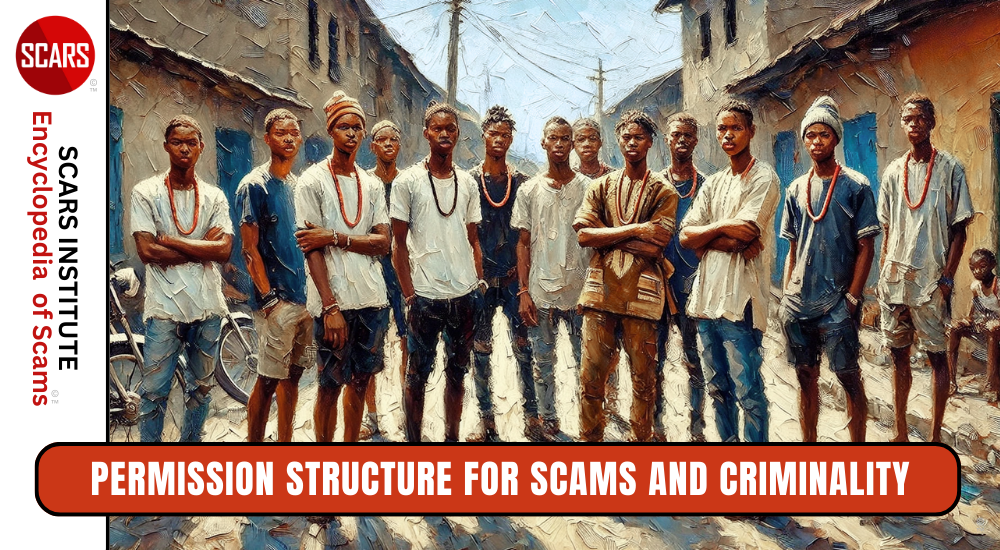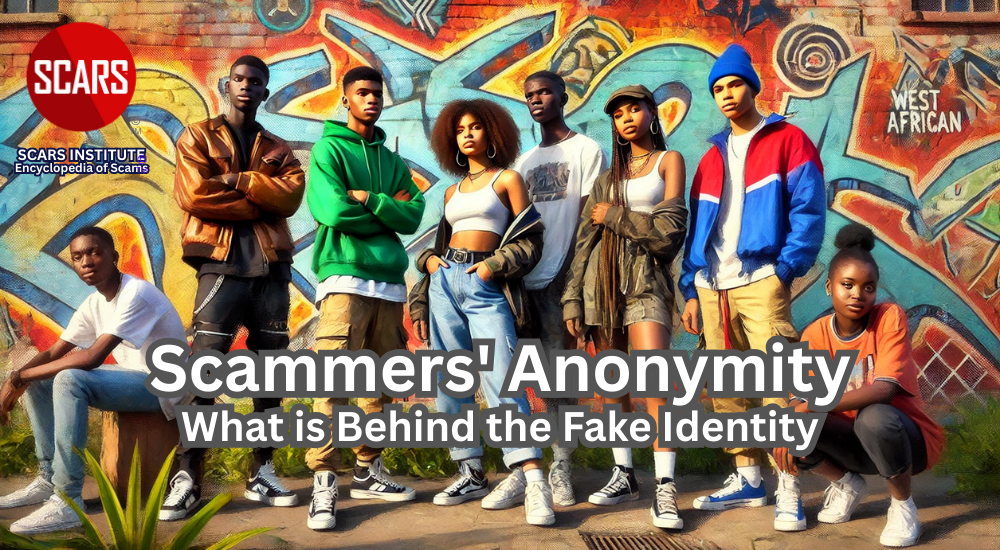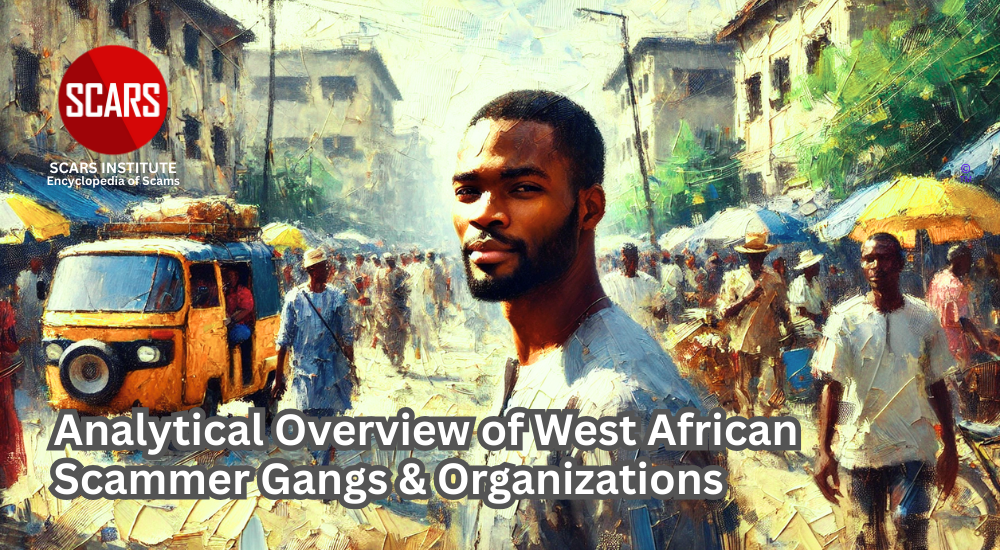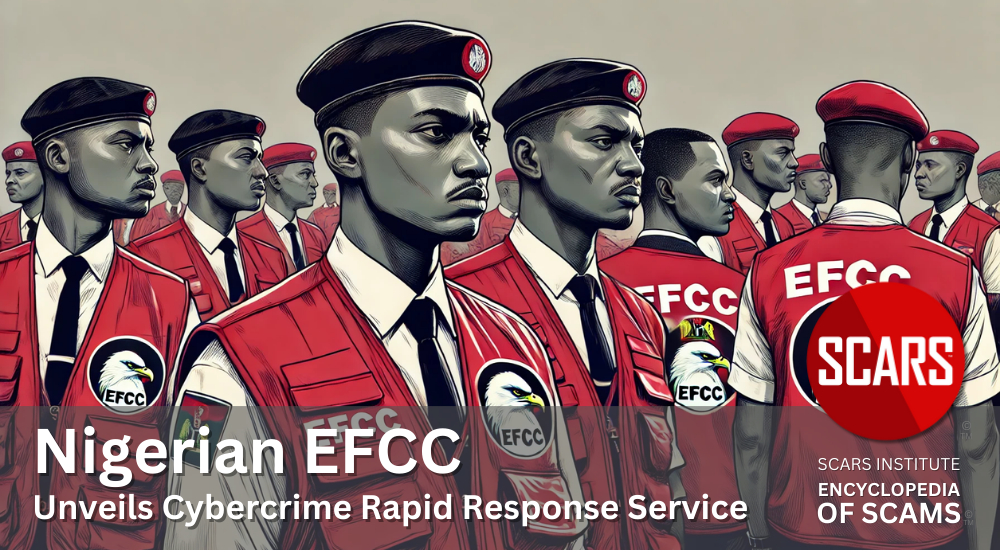
SCARS Institute’s Encyclopedia of Scams™ Published Continuously for 25 Years

 West Africa Scammer’s Paradise
West Africa Scammer’s Paradise
Knowing Your Enemy Is Your Best Defense!
West Africa, also called Western Africa and the West of Africa, is the westernmost subregion of the African continent. West Africa has been defined in Africa as including the 18 countries Benin, Burkina Faso, the island of Cape Verde, Gambia, Ghana, Guinea, Guinea-Bissau, Ivory Coast, Liberia, Mali, Mauritania, Niger, Nigeria, the island of Saint Helena, Senegal, Sierra Leone, Sao Tome and Principe and Togo. These are the same group of countries that are the global hub of the one-on-one Internet frauds.
West Africans primarily speak Niger–Congo languages, belonging mostly, though not exclusively, to its non-Bantu branches, though some Nilo-Saharan and Afro-Asiatic speaking groups are also found. The Niger–Congo-speaking Yoruba, Igbo, Fulani, Akan and Wolof ethnic groups are the largest and most influential. In the central Sahara, Mandinka or Mande groups are most significant. Chadic-speaking groups, including the Hausa, are found in more northerly parts of the region nearest to the Sahara, and Nilo-Saharan communities, such as the Songhai, Kanuri and Zarma, are found in the eastern parts of West Africa bordering Central Africa. The population of West Africa is estimated at 340 million people as of 2013.
The Famous 419 Money Fraud
419 scams are a type of fraud and one of the most common types of confidence trick. The scam typically involves promising the victim a significant share of a large sum of money, which the fraudster requires a small up-front payment to obtain. If a victim makes the payment, the fraudster either invents a series of further fees for the victim, or simply disappears.
There are many variations on this type of scam, including advance-fee fraud, Fifo’s Fraud, Spanish Prisoner Scam, the black money scam, and the Detroit-Buffalo scam. The number “419” refers to the article of the Nigerian Criminal Code dealing with fraud. The scam has been used with fax and traditional mail, and is now used with the Internet. Online versions of the scam originate primarily in the United States, the United Kingdom and Nigeria, with Ivory Coast, Togo, South Africa, the Netherlands and Spain also having high incidences of such fraud.
Of course today, they are many variations of these older Internet Frauds; most notable of them if the Romance Scam for which this website is dedicated.
West African Romance Scam:
A romance scam is a confidence trick involving feigned romantic intentions towards a victim, gaining their affection, and then using that goodwill to commit fraud. Fraudulent acts may involve access to the victims’ money, bank accounts, credit cards, passports, e-mail accounts, or national identification numbers or by getting the victims to commit financial fraud on their behalf.
Scammers post profiles, using stolen photographs of attractive persons, asking for others to contact them. This is often known as catfishing. Letters or emails or messages are exchanged between the scammer and victim until the scammer feels they have groomed the victim enough to ask for money. This might be for requests for gas money or bus and airplane tickets to travel to visit the victim, medical expenses, education expenses etc. There is usually the promise that the fictitious character will one day join the victim in the victim’s country. The scam usually ends when the victim realizes they are being scammed or stops sending money. Victims can be highly traumatized by this and are often very embarrassed and ashamed when they learn they have become a victim of a scam and that the romance was a farce.
In some cases, online dating services are themselves engaged in misrepresentation, displaying profiles which have been fabricated, which use personal information from users who have not agreed to be depicted on the site or by presenting outdated or out-of-region profiles as current and local.
Since this largely originated in Nigeria, it has spread to become a major industry in West Africa with “branch offices” (so to speak) in almost every West African nation and city.
Gallery Of West Africa:
-/ 30 /-
What do you think about this?
Please share your thoughts in a comment below!
LEAVE A COMMENT?
Recent Comments
On Other Articles
- velma faile on Finally Tax Relief for American Scam Victims is on the Horizon – 2026: “I just did my taxes for 2025 my tax account said so far for romances scam we cd not take…” Feb 25, 19:50
- on Reporting Scams & Interacting With The Police – A Scam Victim’s Checklist [VIDEO]: “Yes, this is a scam. For your own sanity, just block them completely.” Feb 25, 15:37
- on Danielle Delaunay/Danielle Genevieve – Stolen Identity/Stolen Photos – Impersonation Victim UPDATED 2024: “She goes by the name of Sanrda John now” Feb 25, 10:26
- on Reporting Scams & Interacting With The Police – A Scam Victim’s Checklist [VIDEO]: “So far I have not been scam out of any money because I was aware not to give the money…” Feb 25, 07:46
- on Love Bombing And How Romance Scam Victims Are Forced To Feel: “I was love bombed to the point that I would do just about anything for the scammer(s). I was told…” Feb 11, 14:24
- on Dani Daniels (Kira Lee Orsag): Another Scammer’s Favorite: “You provide a valuable service! I wish more people knew about it!” Feb 10, 15:05
- on Danielle Delaunay/Danielle Genevieve – Stolen Identity/Stolen Photos – Impersonation Victim UPDATED 2024: “We highly recommend that you simply turn away form the scam and scammers, and focus on the development of a…” Feb 4, 19:47
- on The Art Of Deception: The Fundamental Principals Of Successful Deceptions – 2024: “I experienced many of the deceptive tactics that romance scammers use. I was told various stories of hardship and why…” Feb 4, 15:27
- on Danielle Delaunay/Danielle Genevieve – Stolen Identity/Stolen Photos – Impersonation Victim UPDATED 2024: “Yes, I’m in that exact situation also. “Danielle” has seriously scammed me for 3 years now. “She” (he) doesn’t know…” Feb 4, 14:58
- on An Essay on Justice and Money Recovery – 2026: “you are so right I accidentally clicked on online justice I signed an agreement for 12k upfront but cd only…” Feb 3, 08:16
ARTICLE META
Important Information for New Scam Victims
- Please visit www.ScamVictimsSupport.org – a SCARS Website for New Scam Victims & Sextortion Victims
- Enroll in FREE SCARS Scam Survivor’s School now at www.SCARSeducation.org
- Please visit www.ScamPsychology.org – to more fully understand the psychological concepts involved in scams and scam victim recovery
If you are looking for local trauma counselors please visit counseling.AgainstScams.org or join SCARS for our counseling/therapy benefit: membership.AgainstScams.org
If you need to speak with someone now, you can dial 988 or find phone numbers for crisis hotlines all around the world here: www.opencounseling.com/suicide-hotlines
A Note About Labeling!
We often use the term ‘scam victim’ in our articles, but this is a convenience to help those searching for information in search engines like Google. It is just a convenience and has no deeper meaning. If you have come through such an experience, YOU are a Survivor! It was not your fault. You are not alone! Axios!
A Question of Trust
At the SCARS Institute, we invite you to do your own research on the topics we speak about and publish, Our team investigates the subject being discussed, especially when it comes to understanding the scam victims-survivors experience. You can do Google searches but in many cases, you will have to wade through scientific papers and studies. However, remember that biases and perspectives matter and influence the outcome. Regardless, we encourage you to explore these topics as thoroughly as you can for your own awareness.
Statement About Victim Blaming
SCARS Institute articles examine different aspects of the scam victim experience, as well as those who may have been secondary victims. This work focuses on understanding victimization through the science of victimology, including common psychological and behavioral responses. The purpose is to help victims and survivors understand why these crimes occurred, reduce shame and self-blame, strengthen recovery programs and victim opportunities, and lower the risk of future victimization.
At times, these discussions may sound uncomfortable, overwhelming, or may be mistaken for blame. They are not. Scam victims are never blamed. Our goal is to explain the mechanisms of deception and the human responses that scammers exploit, and the processes that occur after the scam ends, so victims can better understand what happened to them and why it felt convincing at the time, and what the path looks like going forward.
Articles that address the psychology, neurology, physiology, and other characteristics of scams and the victim experience recognize that all people share cognitive and emotional traits that can be manipulated under the right conditions. These characteristics are not flaws. They are normal human functions that criminals deliberately exploit. Victims typically have little awareness of these mechanisms while a scam is unfolding and a very limited ability to control them. Awareness often comes only after the harm has occurred.
By explaining these processes, these articles help victims make sense of their experiences, understand common post-scam reactions, and identify ways to protect themselves moving forward. This knowledge supports recovery by replacing confusion and self-blame with clarity, context, and self-compassion.
Additional educational material on these topics is available at ScamPsychology.org – ScamsNOW.com and other SCARS Institute websites.
Psychology Disclaimer:
All articles about psychology and the human brain on this website are for information & education only
The information provided in this article is intended for educational and self-help purposes only and should not be construed as a substitute for professional therapy or counseling.
While any self-help techniques outlined herein may be beneficial for scam victims seeking to recover from their experience and move towards recovery, it is important to consult with a qualified mental health professional before initiating any course of action. Each individual’s experience and needs are unique, and what works for one person may not be suitable for another.
Additionally, any approach may not be appropriate for individuals with certain pre-existing mental health conditions or trauma histories. It is advisable to seek guidance from a licensed therapist or counselor who can provide personalized support, guidance, and treatment tailored to your specific needs.
If you are experiencing significant distress or emotional difficulties related to a scam or other traumatic event, please consult your doctor or mental health provider for appropriate care and support.
Also read our SCARS Institute Statement about Professional Care for Scam Victims – click here to go to our ScamsNOW.com website.















Thank you for your comment. You may receive an email to follow up. We never share your data with marketers.